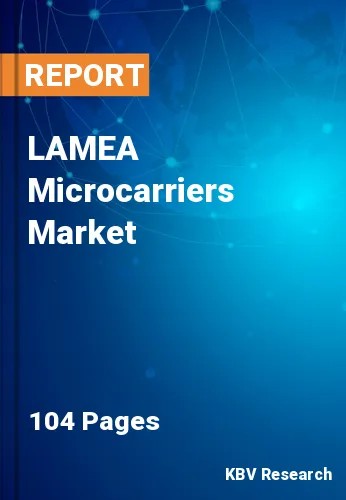The Latin America, Middle East and Africa Microcarriers Market would witness market growth of 16.8% CAGR during the forecast period (2022-2028).
The microcarrier-suspension systems' homogeneity enables the monitoring and regulation of a number of environmental variables, including pH, oxygen tension (pO2), nutrient and metabolite content, and others. More repeatable cell cultures result from improved system control.
The stirred-tank bioreactor, which is used for suspension cell cultures, is a standard piece of equipment that can implement large-scale cultures employing microcarriers quite readily (eg, mammalian cells). Microcarriers also enable scale-up through bead-to-bead cell transfer without the requirement for enzymatic dissociation, which affects the quality of cell output.
The microcarrier technology results in a decrease in laboratory and storage space, a reduction in the work required for routine production, and bigger cell densities as compared to typical static culture systems. Additionally, fewer handling procedures are needed to achieve a certain number of cells, lowering the chance of contamination.
The healthcare sector in the Middle East is experiencing tremendous growth due to various factors, such as government measures to promote medical tourism, changing health insurance laws, and a rising predisposition among the local population to use digital health services. Global healthcare companies are attempting to identify the best business model as they perceive this as a significant growth opportunity. Relationships with IT service providers change as growth strategies for healthcare businesses do, especially now that technology is a crucial component of healthcare funding and delivery.
The Brazil market dominated the LAMEA Microcarriers Market by Country in 2021, and would continue to be a dominant market till 2028; thereby, achieving a market value of $46.7 million by 2028.The Argentina market is experiencing a CAGR of 17.4% during (2022 - 2028). Additionally, The UAE market would display a CAGR of 16.4% during (2022 - 2028).
Based on Consumables, the market is segmented into Microcarrier Beads and Media & Reagents. Based on Microcarrier Beads Type, the market is segmented into, Collagen Coated Beads, Cationic Beads, Protein Coated Beads, Untreated Beads and Others. Based on End-user, the market is segmented into Pharmaceutical & Biotechnology Companies, Contract Research Organizations & Contract Manufacturing Organizations and Academic & Research Institutes. Based on Application, the market is segmented into Biopharmaceutical Production and Regenerative Medicine. Based on Biopharmaceutical Production Type, the market is segmented into Vaccine Production and Therapeutic Production. Based on countries, the market is segmented into Brazil, Argentina, UAE, Saudi Arabia, South Africa, Nigeria, and Rest of LAMEA.
Free Valuable Insights: The Global Microcarriers Market is Predict to reach $2.4 Billion by 2028, at a CAGR of 11.9%
The market research report covers the analysis of key stake holders of the market. Key companies profiled in the report include Thermo Fisher Scientific, Inc., Merck Group, Sartorius Stedim Biotech S.A. (Sartorius AG), Corning Incorporated, Bio-Rad Laboratories, Inc., Danaher Corporation, Eppendorf SE, HiMedia Laboratories Pvt. Ltd., and denovoMATRIX GmbH.
By Consumables
By End User
By Application
By Country
Our team of dedicated experts can provide you with attractive expansion opportunities for your business.

